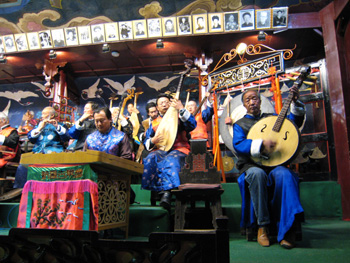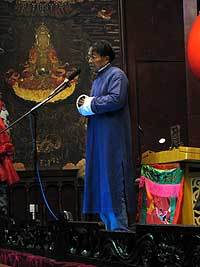 The
concert hall is unheated and cold, but the music is warm, beautiful and
haunting. We are seated in one of the front rows of the hall, a beautiful
building in the old town of Lijiang, located in a picturesque valley
in China's Yunnan province. Though it is January, there are plenty of
tourists, most of whom are Chinese.
The
concert hall is unheated and cold, but the music is warm, beautiful and
haunting. We are seated in one of the front rows of the hall, a beautiful
building in the old town of Lijiang, located in a picturesque valley
in China's Yunnan province. Though it is January, there are plenty of
tourists, most of whom are Chinese.The Naxi Orchestra is made up of 20-24 members, many in their 80's and 90's, dressed in bright traditional costumes. Tonight, because of the cold, we catch glimpses of jeans and warm Western clothing beneath their silk brocaded Chinese gowns. They are playing traditional Chinese stringed instruments like the guzheng, guqin and erhu, accompanied by the dizi—the Chinese bamboo flute. Although they play some traditional Han music (Han are China's largest ethnic group accounting for 90% of the country's population), they specialize in dongjing, a type of Taoist temple music that has been lost elsewhere in China. The melodies evoke waterfalls, birdsong, and other sounds from nature.
Xuan Ke, the venerable Conductor, popular in China and worldwide, has a shock of dark hair and dark skin. Born in 1930, the musicologist and former village school teacher first learned about music from American Pentecostal missionaries. At the urging of his merchant father, he studied Western music at the Kunming Academy. He became passionate about exploring the instrumental music, chants and folk songs of the remote mountain villages in the foothills of the Himalayas.
 After
Chairman Mao Tse-tung's victory in 1949, Xuan Ke became a conductor in
Kunming. When the Red Army entered the city, his orchestra played Schubert's
Marche Militaire. In 1958, when Mao decided that artists and intellectuals
could be a threat to him, Xuan Ke, who played western music and was fluent
in English, was sent for "re-education" to a forced labor camp.
He spent the next twenty years working in a tin mine. There he endured
constant work and was tortured. Once the guards strung him to the roof
beams by his hands, his arms extended in the manner of an orchestra conductor—or
the curcified Christ. He still bears the scars and disfigurement on his
hands and wrists. Many of the musicians in the orchestra suffered as
well, but a good number were able to save their precious antique instruments
from the Red Army by embedding them in walls or burying them in the ground.
After
Chairman Mao Tse-tung's victory in 1949, Xuan Ke became a conductor in
Kunming. When the Red Army entered the city, his orchestra played Schubert's
Marche Militaire. In 1958, when Mao decided that artists and intellectuals
could be a threat to him, Xuan Ke, who played western music and was fluent
in English, was sent for "re-education" to a forced labor camp.
He spent the next twenty years working in a tin mine. There he endured
constant work and was tortured. Once the guards strung him to the roof
beams by his hands, his arms extended in the manner of an orchestra conductor—or
the curcified Christ. He still bears the scars and disfigurement on his
hands and wrists. Many of the musicians in the orchestra suffered as
well, but a good number were able to save their precious antique instruments
from the Red Army by embedding them in walls or burying them in the ground.After his release, Xuan Ke taught English and at the same time put his orchestra back together. Many of his friends had died, but some remained and the orchestra today is made up of white-bearded veterans and the young apprentices to whom they are imparting their unique knowledge of the ancient music. The orchestra has performed in more than twenty countries. At home, it plays every evening and the room is always packed.
After an earthquake struck Lijiang in 1996, the old town survived almost intact but the new town suffered a large amount of damage. It was then decided that all future building should be done in the same manner as the old town. In 1997, Lijiang, the only ancient Chinese city constructed without walls, was designated a UNESCO World Heritage Site.
Click Here for information on our China Tours.


